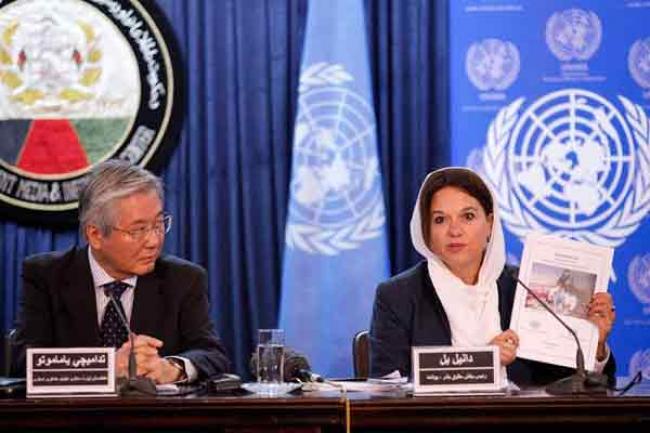Just Earth News 25 Jul 2016, 07:20 pm Print

UNAMA/Fardin Waezi.
Between January and June this year, the human rights team of the UN Assistance Mission in Afghanistan (UNAMA) documented 1,601 civilian deaths and 3,565 injured civilians, an increase of four per cent in the total number of casualties compared to the first six months of 2015, according to the report, titled 'Afghanistan Midyear Report 2016; Protection of Civilians in Armed Conflict.'
The total civilian casualty figure recorded by the UN since 1 January 2009 through 30 June 2016 has risen to 63,934, including 22,941 deaths and 40,993 injured.
“The testimony of victims and their families brings into agonizing focus the tragedy of each one of the 63,934 people killed or maimed by this protracted conflict since 2009,” said UN High Commissioner for Human Rights Zeid Ra'ad Al Hussein in a press release.
This year's casualties include 1,509 children, 388 dead and 1,121 injured, a figure Zeid described as “alarming and shameful,” particularly as it represents the highest numbers of children killed or wounded in a six-month period since counting began in 2009.
There were also 507 women casualties, 130 killed and 377 injured.
The figures are conservative – almost certainly underestimated – given the strict methodology employed in their documentation and in determining the civilian status of those affected.
In the press release, Tadamichi Yamamoto, the Secretary-General's Special Representative for Afghanistan and head of UNAMA, stressed that the report must serve as a call to action by parties to the conflict “to do all they can to spare civilians from the horrors of war.”
“Every single casualty documented in this report – people killed while praying, working, studying, fetching water, recovering in hospitals –represents a failure of commitment and should be a call to action for parties to the conflict to take meaningful, concrete steps to reduce civilians' suffering and increase protection,” Yamamoto said.
“Platitudes not backed by meaningful action ring hollow over time. History and the collective memory of the Afghan people will judge leaders of all parties to this conflict by their actual conduct,” he added.
Casualties attributed to pro-Government forces increased 47 per cent
While anti-Government elements remain responsible for the majority – 60 per cent – of civilian casualties, there was an increase in the number of civilians killed and injured by pro-Government forces between January and June this year.
During this period, UNAMA documented 1,180 civilian casualties attributable to pro-Government forces, which is 23 per cent of the total so far this year, but a 47 per cent increase compared to the same period last year, primarily as a result of ground engagements.
Ground engagements continue to cause the highest number of civilian casualties, followed by complex and suicide attacks and improved explosive devices.
Explosive remnants of war disproportionately impacted children who comprised 85 per cent of the casualties caused by such devices. The report contains several accounts of children killed or maimed while playing with such objects.
During the period covered by the report, 157,987 Afghans were newly displaced – a 10 per cent increase over the same period last year. This brings the estimated total number of conflict-induced internally displaced Afghans to 1.2 million.
The report also documents other serious human rights violations and abuses, including the deliberate targeting of women in the public sphere, use of children in armed conflict, sexual violence against boys and girls, attacks on educational and health facilities, abductions and summary executions.
Human rights defenders, journalists, lawyers and judges have also been targeted, in some cases being labeled by the Taliban as “military targets.”
The report also notes the results of an investigation into the bombing of a Médecins Sans Frontières (MSF) hospital in October last year, stressing that there remains a need for “a fully independent, impartial, transparent and effective investigation” with a view to assessing possible criminal liability.
The report highlights the need for accountability and justice for all human rights violations and abuses, underlining that victims and family members must not be required to submit written complaints for the authorities to initiate investigations, particularly in view of the low literacy rates in the country.
Both UN officials emphasized that the casualties only provide part of the picture of suffering, failing to capture the full extent of the harm and limitations imposed on the Afghan people by the armed conflict.
“The protracted conflict has meant that access to education and healthcare, to livelihood and shelter, to the freedom of movement and to a whole host of civil, political, economic, social and cultural rights has been severely curtailed for millions of Afghans for far too long,” Yamamoto said.
- Pakistan: Police recover two bullet-ridden bodies from Balochistan
- IDF strikes Hezbollah targets in Lebanon after projectile fire toward Northern Israel; 31 killed
- Pakistan: Armed gunmen kidnap 14 workers during coordinated raids in Balochistan
- ISIS-inspired plot foiled in UK: Two men get life sentences for targeting Jewish community
- India rejects allegations, urges Pakistan to tackle its ‘home-grown ills’





-1763561110.jpg)
